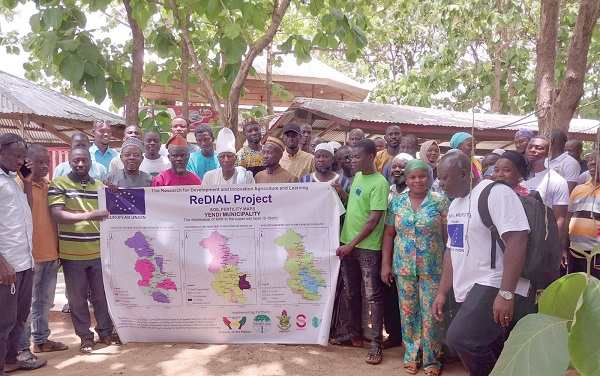
Soil fertility maps launched for farmers in Yendi municipality
A project to develop soil fertility maps to assist farmers in their activities in the Yendi municipality in the Northern Region has been launched.
Dubbed: Research for Development and Innovation Agriculture and Learning (ReDIAL), the project is intended to help farmers to improve yields.
Under the project, soil fertility maps would be developed and presented to farmers and other stakeholders to aid them in their activities.
It is being jointly implemented by the Kwame Nkrumah University of Science and Technology (KNUST), Friends of the Nation and Tropenbos Ghana with funding from the EU.
Some areas samples were taken for the research include Bini, Zagban, Gbungbaliga, Gukpegu, Kuga, Gnani, Paaduli, Kpassani and Sunsong.
In attendant at the launch were farmers, input dealers, staff of the Ministry of Agriculture and the Yendi Municipal Assembly, persons with disabilities, traditional rulers and assembly members, among others.
Relevance
A lecturer in natural resources at Kwame Nkrumah University of Science and Technology (KNUST), Kyereh Boateng, who launched the project, said soil fertility parameters were a prerequisite in soil fertility management.
He, however, said undertaking onsite measurements and laboratory analysis of soil fertility parameters before and during crop cultivation was a challenge for farmers in the country.
According to the lecturer, addressing such difficulties in the municipality would enhance proper farmers’ decisions and policy formulation on crop nutrient management profiles and soil fertility maps.
Another lecturer at the KNUST, Israel Boateng Yeboah, suggested a crop rotation method as an alternative for farmers to improve soil fertility.
According to him, the application of synthetic fertiliser had a long-term effect on the chemical properties of the soil while organic fertiliser enhanced soil properties and increased crop yield.
He mentioned some soil improvement materials, including waste crop residues such as maize stover, maize husk, rice stalks, groundnut pods, cowpea pods and wastewater from fish ponds.
Others are animal manure from sheep and goat droppings, among others.
Another lecturer at KNUST, Prof. Emmanuel Acheampong, urged the participants to apply what they had learned on their farms to improve yields.
The soil fertility maps were handed over to beneficiaries after the launch.
Appeal
The Yendi Municipal Director of Agriculture, Alhaji Abubakari Mohammed, said his outfit lacked the needed resources to embark on sensitisation programmes for farmers on the ReDIAL project and, therefore, appealed for support.
The Yelzoli Tamalnaa, Alhaji Shamrock Mahama, thanked the organisers and sponsors for undertaking the project in the area. He, however, entreated them to extend its duration to 2026, instead of 2024.
